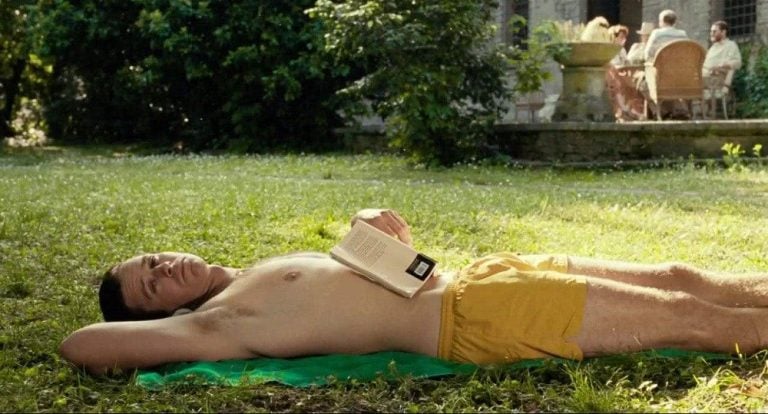Everyone has that summer holiday you’ll never forget. You’re probably picturing it now – the thick warmth of the sun, the briny air filled with salt and sea and possibilities. That sense of nostalgia in the moment, the recognition that you’ll remember this for years to come even as you’re experiencing it.
There’s something liminal about summer. The heat, the humidity, the relaxation – it’s almost embryonic, as the membrane between us and our environment gently dissolves amidst a pure sense of peace. Although, perhaps a better word than liminal is orgasmic. Even before we’ve come of age, there’s a sensuality to summer: the stickiness, the saltiness, the precipice of utter release.
It’s that feeling that Call Me By Your Name captures; the sexuality of summer, the feeling of treasuring a perfect moment even as it slips away. You can synopsise the film in one sentence: in the ’80s, 17-year-old Elio (Timothée Chalamet) falls for Oliver (Armie Hammer), a visiting guest of his father in the beautiful surrounds of Northern Italy. But in the hands of director Luca Guadagnino, this is less a love story than a cinema of sensation: the tenderness of touch, the sheen of sweat, the cool calm of water.
I keep referring to the Oscars because, at this point, Call Me By Your Name looks to be a lock for a suite of Academy Award nominations.
This is an almost perfect film. Guadagnino has teamed up with Apichatpong Weerasethakul’s regular director of photography Sayombhu Mukdeeprom to fashion something that marries the best attributes of both Italian and Thai cinema. Sumptuous, sensual long shots roaming through Italian architecture are counterbalanced by Mukdeeprom’s evocation of the gentle spirituality of nature. The images create a sense of intimacy and distance, perfectly attuned to the paradox of desire.
Those images would be nothing without the players. Chalamet, Hammer and Michael Stuhlbarg (as Elio’s father and Oliver’s professor) each deliver statuette-worthy performances. Nonetheless, Chalamet’s the stand-out, finding an exquisite balance between teenaged braggadocio and the tentative uncertainty that comes with first love. His dialogue is withholding, but the way he twists and contorts his body throughout evokes the depth of his desire – and internal conflict.
If there’s justice in the world, Hammer and Stuhlbarg will be competing for Best Supporting Actor come March. They’d each be deserving winners. While framed as an object of desire, Hammer complicates that characterisation by feinting at his own interiority; his own reluctance. Stuhlbarg has a smaller role, but late in the piece delivers the kind of speech that makes a case for an Oscar all by itself.
I keep referring to the Oscars because, at this point, Call Me By Your Name looks to be a lock for a suite of Academy Award nominations, including Best Picture. That puts some heavy expectations on the film, particularly in the wake of Moonlight’s surprise win last year. I’m not sure it can sustain that weight. Unlike Moonlight, which put its interrogation of identity politics front and centre, Call Me By Your Name keeps its politics largely implicit. That’s consistent with Guadagnino’s oeuvre – see last year’s A Bigger Splash, which carefully concealed a savagely pointed subtext about immigration – but leaves the film vulnerable to criticisms of shallowness.
While such accusations are misguided, they’re fuelled by the film’s major – and, I’d argue, only – misstep. After days of shielded glances and coded conversations, Elio and Oliver consummate their romance on a warm Italian evening. But as they begin to unclothe, Guadagnino’s camera quietly pans away from the lovers to settle its gaze on a rustling tree outside. It’s a deliberate choice – perhaps out of discretion, perhaps out of a desire to maintain that fragile sense of nostalgic anticipation – but it’s a poor choice, one that briefly saps the film of its syrupy atmosphere.
I’m not convinced that you can reasonably extrapolate, as some critics have, from that moment into an interpretation of the film as coy or afraid of its own sexuality. The film pulsates with desire – at one point literally, as the solidity of the frame degrades with the force of Elio’s want. The camera craves Hammer’s barely-clad form (barely-clad to the point that his unmentionables had to be CGI’d out of the final cut due to some very short swimmers), as though – to quote the screenplay – “daring you to desire” him. While the film is not as explicit (read: horny) as its source material, Andre Aciman’s novel, it’s hardly a demure affair.
Nor does the sensuous simplicity of Call Me By Your Name suggest a disinterest in the politics of queerness. Guadagnino folds Italian history into his filmmaking, whether ancient – the seductive statues studied by Elio’s father – or modern, as in a casual reference to Mussolini. Oliver’s reluctance to share his feelings with Elio despite his obvious infatuation speaks volumes about the wider environment of intolerance, even if they’re able to hide away in the idle rich privilege of Northern Italy. The story avoids the obligatory tragedy so common in queer literature for something more ambiguous, and something richer.
Call Me By Your Name’s credits roll over an unbroken close-up of Elio’s face. It’s winter; the sun has faded from the sky, supplanted by a dusting of snow over the Italian countryside. Yet something lingers, a warm ball of summer glowing through the winter haze. So too does the film linger. Just as the crystalline perfection of that summer holiday never really dissipates, Call Me By Your Name is an experience that resonates beyond its runtime.
You can read our review of another Oscar frontrunner, Paddington 2 (no, seriously) here.


































